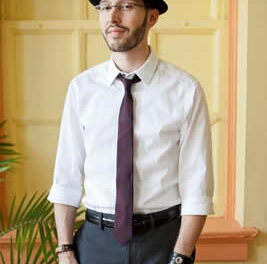As intoxicating as a Chanel fragrance and as misleading as a retail shopping sale, Don Juan’s love may be more powerful than Cupid’s…and he works at an Italian restaurant.
Triad Stage‘s Don Juan, adapted and directed by Preston Lane, is a gleefully sidesplitting play. The product of forgotten playwright Tirso de Molina, Don Juan has been the subject of numerous artistic works ranging from the sublime (Mozart’s Don Giovanni) to the horrendous (the Johnny Depp/Marlon Brando comedy Don Juan DeMarco). While Moliere’s take on the tale is set in Sicily, Lane’s adaptation takes place at a low business Italian restaurant, where the ensemble of waiters promises to deliver something the restaurant’s main competition (I’ll give you a hint: endless salad and breadsticks does not have culture).
Howard C. Jones’ sparse set morphs from cobweb covered table settings to a theatrical stage as the minimum wage restaurant staff take it upon themselves to perform Moliere’s Don Juan after a last-minute cancellation from the original presenters, “The Triad Stage.” Events unfold in typical backstage comedy fashion as they attempt to tell the story: Don Juan, the greatest lover of all time, has returned to Sicily to marry the daughter of a general he killed. While there, he romances other women, swordfights with his (current) fiancée’s brother, and encounters the threat of death by the General’s ghost. The play contains a solid plot with typical stock characters that each gets his or her spotlight moments in loquacious monologues and soliloquies. Lane stays true to these, but he and his actors have added many surprises along the way.
Each actor in the ensemble embraced each respective moment; notable standouts include Mickey Solis, Deirdre Friel, and Jamison Stern, all play multiple characters, displaying their unending range of talent. As unprepared as the fictional actors claim they are, it becomes clear that they know the play as well as they know the restaurant’s menu.
In this story about the greatest lover of all time, Triad had its audience swooning, or more likely, falling out of their seats from laughing. The writing has the exhilarating speed of the greatest Marx Brothers films; Lane has modernized many of the speeches without losing Moliere’s comedic sensibilities. His direction with his colleagues’ eye-popping set, light, and sound designs reminded us of the wacky worlds of Pedro Almodovar and Looney Toons. Lane filled the play-within-a-play with more than enough pop culture references, slapstick antics, and, yes, not-so-subtle innuendos to display that he is the fulfilling leader of this anarchic masterpiece. Yes, there was even an HB2 joke.
In another Triad production that also featured Mickey Solis, Wait Until Dark, Lane single-handedly found a way to control his audience’s breathing during the most suspenseful moments of the show. Here, Lane did the same thing, that is, if you can catch a breath long enough to know he was doing it. The actors breaking the fourth wall and talking to the audience worked better here than it did in The 39 Steps.
Although the fight scenes deflated the show’s energy in pivotal moments, the production’s intensity remained high. It is a worthy accomplishment for a production to have its audience laughing at the high energy and sheer ridiculousness it brings, while still keeping them invested and caring about where the comedy is heading. A comedy of this quality of stature, one that is accessible to all audiences, despite its source material’s unfamiliarity, should be treasured by all.
As Triad approaches its 15th anniversary, Don Juan gives its supporters a solid case for this company’s place in its community. There may be no indication of what the next 15 years holds for Triad Stage, but for now, we can return to Don Juan exhaustively during its run and fall in love with the production and Triad Stage again and again.
Don Juan continues through Sunday, June 26. For more details on this production, please view the sidebar.











